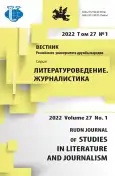Feminine Imagery in Chinese Lyrics of the Six Dynasties
- Autores: Malakhevich D.E.1
-
Afiliações:
- The Institute of Asian and African Studies of Lomonosov Moscow State University
- Edição: Volume 27, Nº 1 (2022)
- Páginas: 86-93
- Seção: LITERARY CRITICISM
- URL: https://journal-vniispk.ru/2312-9220/article/view/318975
- DOI: https://doi.org/10.22363/2312-9220-2022-27-1-86-93
- ID: 318975
Citar
Texto integral
Resumo
This article deals with the specifics of female imagery in Chinese poetry of the Six Dynasties period ( Liuchao ). The aim is to characterize female imagery in the works of the poets of this period and find out what changes these images underwent in comparison with previous epochs, and how the structure of these images differs in female and male poetry. The aim is to analyze the “women topic” in the works of the leading poets of the Six Dynasties period. The conclusion is made that in men’s poetry of the mentioned period the female image remains idealized, unified and narcissistic. Male poets used a standard set of artistic means to portray female images. The woman was presented as an object of aesthetic pleasure, and appeared to the reader in an inseparable connection with her surroundings and boudoir objects. In this regard, the thesis of the emergence of the image of a “beautiful lady” in Luchao poetry is put forward. Nevertheless, in both women’s and men’s lyrics more individualized images began to appear and a departure from traditional gender stereotypes is obvious; the main change in Six Dynasties poetry is the development of self-awareness in female and male poems, both in life and poetry, and the increasing understanding of their own subjectivity. The female characters of the Luchao era turn out to be endowed with reflexivity and psychologism. Lyrics on women’s themes developed both quantitatively and qualitatively.
Palavras-chave
Sobre autores
Daria Malakhevich
The Institute of Asian and African Studies of Lomonosov Moscow State University
Autor responsável pela correspondência
Email: malakhevichd@yandex.ru
ORCID ID: 0000-0002-0340-4495
MA in Philology, PhD student at the Department of Chinese Philology
11/1 Mokhovaya St, Moscow, 125009, Russian FederationBibliografia
- Gan, B. (1994). Notes on a Search for the Spirits (Sou shen ji) (pp. 12–15). Trans. by L.N. Menshikov. Saint-Petersburg. (In Russ.)
- Ge, H. (1954). Baopu-tzu, Weipian, Jimyu. 葛洪,抱朴子-外篇-疾谬 [Treatise of Baopu-tzu, Outer Part, Chapter “Diseases and Delusions”]. Zhongguo shuji (p. 148). (In Chinese).
- Kravtsova, M.E. (1983). “The Beauty” — Female Image in Chinese Poetry (Poetry of Antiquity and Early Middle Ages). The Problem of Man in Traditional Chinese Doctrines. (pp. 153–162). Moscow: Nauka publ. (In Russ.)
- Kravtsova, M.E. (2013). The Experience of Thematic Analysis of the Chinese Lyric Poetry of the Six Dynasties Era (III–VI Centuries). Asiatica: Works on Philosophy and Cultures of the East, (7), pp. 28–59. (In Russ.).
- Lu, S. (2005). Weijin Nanbeichao xiaosho nuxing xingxiang jedu. 楼淑君,魏晋南北朝小说女性形象解读 (Interpretation of female characters in Weijin and Nanbeichao period novels). Guangxi Journal of Social Sciences, (7), 91–93. (In Chinese).
- Ou, Y. (2007). Weijin Nanchao wenxue zijuexing chengyin jiangxi. 欧阳年,魏晋南朝文学自觉性成因浅析. [Analysis of the Reasons for the Formation of Literary Identity during the Wei Jin and Southern Dynasties]. Journal of Hunan University of Radio and Television, (1), 57–60. (In Chinese).
- Robertson, M. (1992). Voicing the Feminine: Constructions of the Gendered Subject in Lyric Poetry by Women of Medieval and Late Imperial China. Late Imperial China, 1(13), 63–110.
- Vakhtin, B.B. (1974). Notes on the Lyric Poetry of Shen Yue. Historical-Philological Research. Мoscow. (In Russ.).
- Wang, Y. (2010). Danzhuang nunmo zong xiangyi: Handai yu Weijin shiqi shigezhong nyuxing xingxiang bijiao. 王勇, 淡妆浓抹总相宜--汉代与魏晋时期诗歌中女性形象之比较 [“In any outfit you, my dear, are good”: A comparison of female images in Han and WeiJin period poetry]. Anhui Literature, (4), 79. (In Chinese).
- Wang, Y. (2010). Jianlong Weijin Nanbeichao fujun nuxing xingxiang de xingcheng yuanying. 王勇,浅论魏晋南北朝赋中女性形象的形成原因. [A Brief Review of the Factors that Influenced the Formation of Female Imagery in the Odes of the Wei Jin and Nanbeichao Periods]. Journal of Taiyuan University Pedagogical Institute, (28), 45–46. (In Chinese).
- Wang, D. (2013). Zuo Si “San du fu” Ye du xuanjie yu miaose. 王德华. 左思《三都赋》邺都的选择与描写 [Description of the Capital of Ye in the “Odes on the Three Capitals” by Zuo Si]. Zhejiang dasyue xuebao, 43(4), 146–156. (In Chinese).
- Xie, W. (2019). Zhongguo funyu wenxueshi. 谢无量,中国妇女文学史/著(History of Chinese Women’s Literature). Jinan: Shandong huabao chubanshe. (In Chinese).
- Yang, L. (2016). Weile genhaode huoje: Weijin nyuxing zhuixing duly de qiuzhe daolu. 杨露,为了更好的活着--魏晋女性追求精神独立的曲折道路 [In Pursuit of a Better Life: the Uneasy Journey of Wof the Weijin Period to Gain Spiritual Independence]. Lanzhou, Gansu: Institute of Literature, Northwest Pedagogical University publ. (In Chinese).
Arquivos suplementares









